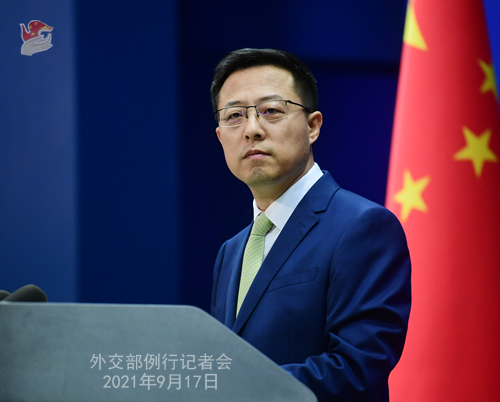
CCTV: President Xi Jinping will attend the 21st Meeting of the Council of Heads of State of the Shanghai Cooperation Organization (SCO) and the meeting on Afghanistan of the heads of state of the Shanghai Cooperation Organization (SCO) and the Collective Security Treaty Organization (CSTO) via video conference. I wonder if any Chinese representative will attend the meeting offline?
Zhao Lijian: In coordination with the virtual attendance of President Xi Jinping at the SCO summit, State Councilor and Foreign Minister Wang Yi, as the special representative of President Xi Jinping, will attend the meeting offline in Dushanbe, Tajikistan.
AFP: Firstly an investigation found that the head of the IMF Kristalina Georgieva, during her tenure as Chief Executive of the World Bank, asked staff to alter a World Bank report to avoid angering China. What's your response? Secondly, who'll represent China at the upcoming UN General Assembly?
Zhao Lijian: On your first question, Ms. Kristalina Georgieva already issued a statement on the IMF website, and I'd like to refer you to the relevant party for more details.
We also noticed that the World Bank has issued a statement on suspending publication of its Doing Business report.
The Chinese government attaches great importance to improving the business environment, and its achievements are there for all to see. We hope that the World Bank will conduct a comprehensive investigation of relevant issues in strict accordance with the principles of professional, objective, fair and transparent internal review, based on facts and rules, so as to better safeguard the professionalism and credibility of the Doing Business Report and the reputation of the World Bank and its member countries.
On your second question, I have nothing to release at present.
PTI: Today on the sidelines of the SCO meeting, Indian External Affairs Minister S. Jaishankar and Chinese Foreign Minister Wang Yi met. Do you have a readout on that? Can you provide us some details?
Zhao Lijian: On September 16, local time, Chinese State Councilor and Foreign Minister Wang Yi met with Indian External Affairs Minister S. Jaishankar in Dushanbe at request.
State Councilor Wang said that China has always properly handled the China-India border issue with a positive attitude. The communication between the diplomatic and military departments of the two countries in the previous stage has been serious and effective. The China-India border situation is generally moving in the direction of amelioration. We hope that the Indian side will work with China to continuously stabilize the situation and gradually shift from emergency response to regular management. The two sides should consolidate the achievements of disengagement of front-line troops, strictly abide by agreements and consensus reached between the two countries, jointly safeguard peace and tranquility in the border areas and prevent the recurrence of border-related incidents.
State Councilor Wang pointed out that China and India, as two major emerging economies, should continue to adhere to the strategic consensus that the two countries pose no threat but offer development opportunities to each other, and bring bilateral relations and practical cooperation onto the track of sound and steady development. This is not only in the common interests of the two countries, but also conducive to regional and world peace and development.
External Affairs Minister S. Jaishankar said India and China have made progress in dealing with the border situation, while there are still some outstanding issues to be resolved. India is ready to work with China to abide by the agreements reached between the two sides, push for positive outcomes of the next round of commander-level meeting and earnestly safeguard peace and tranquility in the border regions. The Indian side hopes that both sides will work together to bring India-China relations back on track, and guide all parties to establish a perception of India-China relations that is more positive and mutually beneficial. India does not subscribe to any clash of civilisations theory, and believes that solidarity among Asian countries is very important. Asian solidarity would be impossible without India-China cooperation. India is willing to strengthen communication and coordination with China within the frameworks of BRICS and the Shanghai Cooperation Organization to jointly tackle terrorism and other global challenges.

Bloomberg: China has applied to join the CPTPP. Is China willing to talk to Australian ministers about their bid to join the pact? And if so, when would that take place?
Zhao Lijian: Almost a year ago, China expressed its readiness to actively consider joining the CPTPP. Over the past year, China had informal contacts with the pact members in accordance with CPTPP regulations. On the basis of comprehensive study and assessment of the terms of the agreement and following relevant procedures and steps, Minister of Commerce of China Wang Wentao submitted China's official application to join the CPTPP in a letter to Trade Minister Damien O'Connor of New Zealand, the depositary of the agreement.
We believe that, built on RCEP's conclusion, China joining the CPTPP would help promote economic integration in the Asia-Pacific, and facilitate post-COVID economic recovery, trade development and investment growth in the world.
As for you specific question, China will follow relevant procedures of the CPTPP to have necessary consultations with the members.
Yonhap News Agency: I have two questions. Firstly, what is China's position on the Security Council meeting on the DPRK's ballistic missile launches? Secondly, the Six-Party Talks on the Korean nuclear issue have been halted for more than 10 years. How does China view the prospect of the resumption of the talks?
Zhao Lijian: On your first question, the UN Security Council discussed relevant issue in its internal consultations, during which China reiterated its principled position. We believe that the overall stability on the Peninsula has not come easily and all parties should bear in mind the bigger picture, be cool-headed, exercise restraint, be prudent in words and actions, avoid escalation of the situation and ensure that the Korean Peninsula issue stay on the track of political settlement. We hope relevant parties will stick to the right path of dialogue and engagement, abandon the old path of hostility and confrontation, and earnestly seek an effective political solution to the Korean Peninsula issue in accordance with the dual-track approach and the principle of phased and synchronized actions.
China always believes that the Security Council should play a positive and constructive role in promoting the political settlement of the Korean Peninsula issue. China and Russia have repeatedly called on the UN Security Council to invoke the rollback terms of the DPRK-related resolutions as soon as possible and make necessary adjustments to relevant sanctions, especially relating to provisions on the humanitarian and livelihood aspects, so as to create conditions and atmosphere for breaking the current impasse and resuming dialogue. China will continue to make positive efforts to this end.
On your second question, the Six-Party Talks is an effective mechanism for denuclearization on the Korean Peninsula and peace and stability of the Peninsula and Northeast Asia as well as an important platform for improving relations among parties. The goals set in the talks and the principles of addressing the concerns of all parties in a synchronized, reciprocal and balanced manner are still of guiding significance. Of course, the resumption of the talks also faces many difficulties, which requires all parties to meet each other halfway.
At present, the situation on the Peninsula is at an important and delicate juncture. All parties concerned should be prudent in words and actions and continue to resolutely advance the political settlement of the Korean Peninsula issue.
Beijing Youth Daily: On September 16, China, Russia, Pakistan and Iran held an informal meeting on the Afghan issue. Could you tell us more about the meeting?
Zhao Lijian: On September 16, State Councilor and Foreign Minister Wang Yi met in Dushanbe with Russian Foreign Minister Sergei Lavrov, Pakistani Foreign Minister Shah Mahmood Qureshi and Senior Representative of Iranian Foreign Minister Rasoul Mousavi on the sidelines of the SCO and CSTO summits to discuss the situation in Afghanistan. Russian Foreign Minister Lavrov chaired the meeting.
The parties reaffirmed their commitment to promoting peace, security and stability in Afghanistan and the region at large. They stressed that the sovereignty, independence and territorial integrity of Afghanistan should be respected, the basic principle of "Afghan-led, Afghan-owned" should be implemented, and the right of the Afghan people to pursue peace, tranquility, development and prosperity should be upheld.
The parties stressed that the US and its allies bear the primary responsibility for Afghanistan's social and economic reconstruction and should provide much-needed economic, livelihood and humanitarian assistance to Afghanistan.
The parties believe that Afghanistan needs to realize national reconciliation and establish an inclusive government that takes into account the interests of all ethnic groups. Noting the security challenges facing Afghanistan, they stressed the need to coordinate efforts to address such threats as terrorism and drug trafficking, and to safeguard regional stability and the legitimate concerns and interests of neighboring countries.
The parties expressed concern over the uncertain humanitarian and socio-economic situation in Afghanistan and the possible risk of refugee flows, pointed out the necessity of Afghanistan's return to peace and economic recovery, and called on the international community to continue to provide humanitarian assistance to Afghanistan.
The parties agreed to continue coordination and convene meetings at various levels at appropriate times.
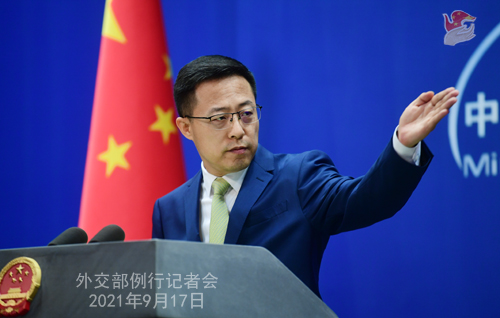
NHK: I have two questions. The LDP presidential election in Japan kicked off today. The result would have a major impact on the candidate for the new Prime Minister of Japan. What is China's comment on this? The EU released the EU Strategy for Cooperation in the Indo-Pacific, which said it would strengthen economic relations with Taiwan, and enhance naval presence by EU Member States in the Indo-Pacific. What is China's comment on this?
Zhao Lijian: Your first question is about Japan's internal affairs which China would not comment on.
On your second question. The Taiwan region's participation in regional economic cooperation must be handled in accordance with the one-China principle. We firmly oppose the discussion and signing of agreements with implications of sovereignty and of official nature between any country and the Taiwan region. China's position on this issue is clear and resolute. As to the issue of non-regional countries sending vessels to the Asia-Pacific, China hopes that countries outside the region will respect the aspiration of countries in the region to maintain peace and stability and promote cooperation for development, and refrain from taking actions that could complicate the situation.
Reuters: As you already mentioned, China filed an application to join the CPTPP. Is there any significance to the timing of this application, which was shortly after the new alliance announced by Australia, the UK and the US this week?
Zhao Lijian: I have just elaborated on the background of China's official application to join the CPTPP, which has no connection with the agreement among the US, the UK and Australia. I want to emphasize that China is a staunch advocate for trade liberalization and facilitation, and an important participant in cooperation and economic integration in the Asia-Pacific. China's official application to join the CPTPP again demonstrates China's firm resolve in opening up and promoting regional economic cooperation.
You just tried to build a connection between the two issues. People can tell that what China works for is economic cooperation and regional integration. What the US and Australia push for is wars and destruction.
Prasar Bharati: Just now you mentioned certain points from Indian External Affairs Minister's statement during the meeting with Chinese Foreign Minister Wang Yi in Dushanbe. Dr. Jaishankar also said that India and China have to establish a relationship based on mutual respect. And for this, it was necessary to avoid viewing our bilateral relations from the perspective of its relations with third countries. Do you have any comments or response to this particular part?
Zhao Lijian: China agrees with what the Indian side said about "it is essential to avoid viewing bilateral relations through the lens of a third country". Both China and India are important countries in Asia. The development of China-India relations has its own logic. China-India relations have never targeted any third party.
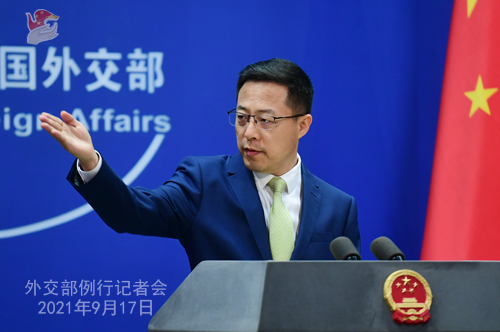
HRTN: The Shenzhou-12 manned spacecraft returned to Earth around an hour ago. As we understand, the preparations for the Shenzhou-13 mission are already in place and it is set to be launched in October this year. The rapid development of China's aerospace industry has drawn extensive attention from inside and outside of China. Do you have any response to that?
Zhao Lijian: Shortly before today's press conference started, I witnessed with full excitement the historic moment of the Shenzhou-12 manned spacecraft's return to Earth, just as many of you did. At this moment, I'd like to say welcome home to Shenzhou-12, and to our three hero astronauts!
Since its launch on June 17, the crew of Shenzhou-12 had worked and lived in the space station for 90 days, during which they conducted multiple tasks including extravehicular repair and maintenance, appliance switch and scientific operation of payloads, and set a new record of the longest space stay in a single flight for Chinese astronauts. Yesterday, the Shenzhou-12 manned spacecraft successfully separated with the Tianhe core module, and performed circumnavigation and radial rendezvous tests, which completed the verification of vertical rendezvous technology, laying important technological foundation for the future manned missions.
As we welcome and celebrate the return of Shenzhou-12, we can't help recall the successful launch of the Shenzhou-5 manned spacecraft back in 2003. Eighteen years has passed since China became one of the few countries that are able to launch manned mission independently. Over the past 18 years, China's manned mission has continued to make strides, from one-man to three-man crew, from inside-capsule work to spacewalk, and from short to medium-term stay. Each stride forward embodies the courage and perseverance of the astronauts in pursuing the space dream, which contributes China's wisdom and strength to the peaceful use of space by mankind.
Space exploration is a common cause for mankind. The Chinese government is committed to peaceful use of outer space and has conducted extensive cooperation and communication with relevant countries in the manned space sector in line with the principles of "peaceful use, equality, mutual benefit and common development". China's space station has entered the phase of comprehensive construction. China will continue to engage in international cooperation and exchanges at wider scope and deeper level, and make Chinese space station a space lab that can deliver benefits to mankind, and make positive contributions to the exploration of the mysteries of the universe, the peaceful use of outer space and the building of a community with a shared future for mankind.
TASS: I have a question about the joint statement of Australia-US ministerial consultations. It contains some remarks against China on issues related to the South China Sea, Xinjiang, Hong Kong, Taiwan, and other China-related issues. Does China have any comment on that?
Zhao Lijian: China's position on the issues including the South China Sea, Taiwan, Hong Kong and Xinjiang is consistent and clear. The United States and Australia are complicit in deliberately smearing China, interfering in China's internal affairs and driving a wedge between regional countries for their own geopolitical gains. China deplores and firmly opposes this.
Facts have proved that China is not only the main engine driving economic growth in the Asia-Pacific region, but also a staunch supporter of regional peace and stability. China's development is a growing force for world peace and good news for regional prosperity and development. China always believes that cooperation between countries should conform to the trend of peace and development of the times and help enhance mutual trust and cooperation among countries. It should not target any third party or harm its interests.
The US and Australia should follow the trend of the times, respect the common aspirations of countries in the region, discard the outdated Cold War zero-sum mentality and narrow-minded geopolitical perception, view China's development in a correct way, and stop interfering in China's internal affairs and making waves in the Asia-Pacific region.
Prasar Bharati: A follow-up on the meeting in Dushanbe between both foreign ministers. In this regard, my question is, does China see its relations with India based on India's relations with any third country?
Zhao Lijian: I believe I've made it very clear. The development of China-India relations has its own logic. China-India relations have never targeted any third party and are not based on any third party.
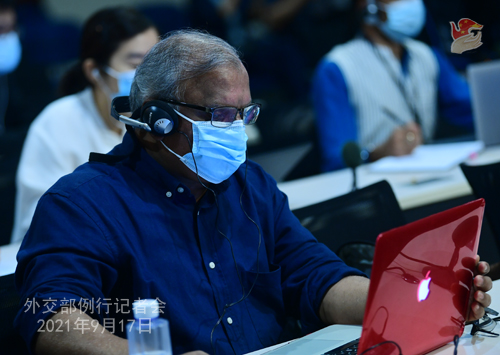
Prasar Bharati: Earlier this week you said that if India has a need to discuss the issue of return of Indians to China, they may raise this with the Chinese side. I have learned and I understand that Indian embassy and consulates have repeatedly taken up this matter of return of Indians with Chinese authorities. But China has not entertained this request giving COVID-19 as a reason. So can you confirm that the Indian side is in touch with the Chinese side regarding this issue?
Zhao Lijian: Given the ongoing complex and grave situation of the pandemic, China applies quarantine measures equally to all inbound travelers, including its own citizens, based on the evolving situation, realities on the ground and science-based assessment. The travel of India's necessary personnel to China has always been guaranteed. We hope that the Indian side will also treat Chinese nationals going to India in an indiscriminate manner, create a necessary and healthy environment for them to work and live in India, and jointly do a good job in personnel exchanges between the two sides.
Follow-up: So you confirm that the Indian side is in touch with the Chinese side regarding this issue?
Zhao Lijian: We are maintaining communication through unimpeded diplomatic channels in both Beijing and New Delhi.
****************
As per the public holiday schedule of the upcoming Mid-Autumn Festival, our regular press conference will be adjourned from September 20 to 21 and resumed on September 22. During the adjournment, you may still reach the MFA Spokesperson's Office via fax, e-mail and WeChat. As the Mid-Autumn Festival is drawing near, I have a few more words to say: We see Shenzhou soaring into vast cosmos and Jiaolong diving into the deep ocean. Why not join us in appreciating the beauty of the moon on the Mid-Autumn Festival? Once again, we welcome the Shenzhou-12 heroes home for the Mid-Autumn Festival and wish everyone a happy Mid-Autumn Festival!
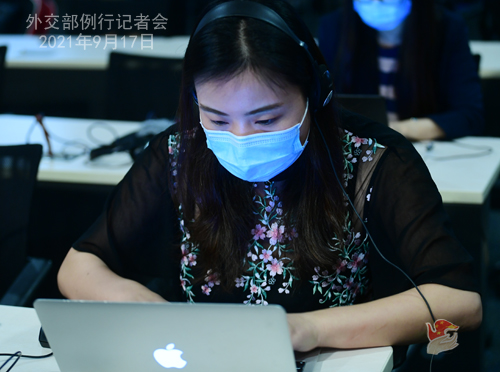
****************
The following question was raised after the press conference: Venezuela's special envoy Alex Saab was accused of money laundering by the US Department of Justice in July 2019, and he was detained in Cape Verde in June 2020 when his plane stopped there to refuel. It is reported that a Cape Verde court has recently approved Alex Saab's extradition to the US. Do you have any comment?
Zhao Lijian: The US has been playing a disgraceful role on the Venezuelan issue. It has constantly abused political and judicial maneuvers, including sanctions and extraditions for the purpose of meddling with Venezuela's internal affairs. Such US practice of political bullying impacts regular international personnel exchanges and endangers mutual trust and cooperation between countries. China firmly rejects this. China urges the US to change its old habit, heed the call for justice from the international community, and abide by international law and basic norms governing international relations.

